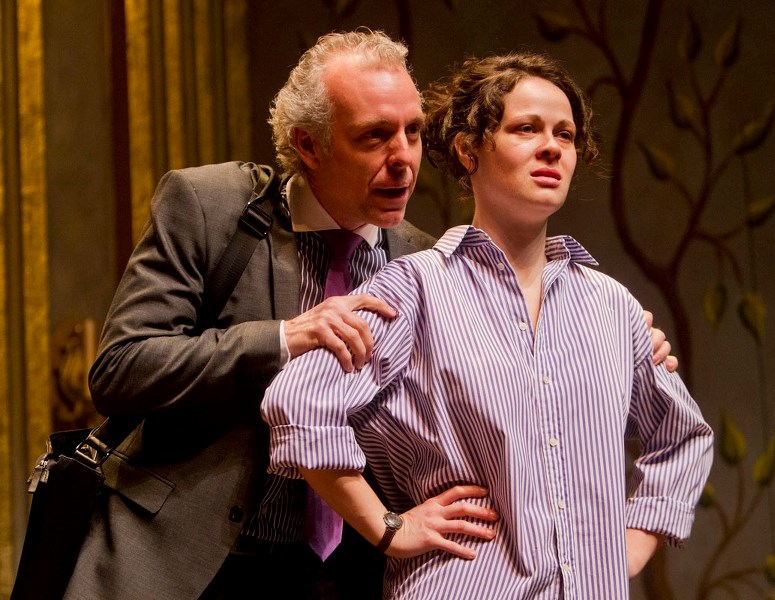Wanted: Theatregoers willing to sit for three hours of intellectual gymnastics.
That’s what’s on offer at the Citadel Theatre as the Robbins Academy presents Arcadia now running until Saturday, April 11.
Anyone looking to sit back, relax and be entertained may be disappointed. Arcadia is too complex and convoluted to slip into autopilot.
Playwright Tom Stoppard’s 1993 play is regularly cited as one of the greatest works in the last 50 years. It is without a doubt clever and complicated.
Arcadia is a tale of two centuries in pastoral England – the early 19th century as it transitions from the classic to romantic period and our contemporary era.
Stoppard weaves some pretty hefty ideas together – the past versus the present; science and mathematics versus poetry and literature; and lastly, the order of rational philosophy versus the chaos of creative romantic notions.
This play of ideas is clever and complicated, and at times almost beyond the point of comprehension. There’s a nagging belief that Stoppard compresses so many ideas and juggles so many balls related to the meaning of life, that a few get lost along the way.
The play is set in Sidley Park, an English manor home. The past and present share the same set – a stately room beautifully designed by Leslie Frankish that recreates the pastoral quality of country estates.
It is within these four walls that Arcadia starts with Thomasina Coverly, a 13-year-old girl asking her tutor what “carnal embrace” is. This is a big hint foreshadowing upcoming passions. But whereas the lusty fornication happens off-stage, it’s the crackling intellectual fireworks that play out in full view.
Trying to sum up Arcadia’s plot in a few paragraphs is like trying to solve the riddles of the Earth in one day. When the first act opens in 1809, Lady Croom is changing the garden of her estate from classic to Gothic, a reflection of then modern fashions.
Jump forward to the 20th century and Hannah Jarvis, a best-selling author visits Sidley Park to research a book on the breakdown of the Romantic imagination. During her stay, Bernard Nightingale, an arrogant, self-promoting windbag of an academic also arrives to follow up on a theory that Lord Byron once stayed at Sidley Park and possibly killed a man in a duel.
As the duo leafs through old documents, drawings and books, they discover material mostly created by Thomasina, Lady Croom’s daughter, as she undertook her studies with her tutor, Septimus Hodge.
It quickly becomes apparent Thomasina is a genius. Her curiosity is unquenchable and she understands advanced mathematics far above the level of adults surrounding her.
By comprehending the laws of thermodynamics, a concept only possible to prove in the 20th century due to computer modelling, she realizes that heat only travels one way. It cools down and when applied to the universe, it spells disordered doom.
As Bernard and Hannah ponder the young prodigy’s equations and documents, they interpret and more often misinterpret past events.
Intellectual passion is at the forefront of Arcadia, however running through both centuries are threads of sexual intrigue that heat up the stage in different waya.
Director Tom Wood seamlessly handles the transitions between the two time frames and the cast crackles with energy.
Claire Armstrong as Hannah Jarvis is the classic scholar favouring order and repression of emotions. And while intellectual pursuits are her forte, we see a glimmer of sadness at the loneliness it bequeaths.
Jamie Williams is riveting as Bernard, the buffoonish, pompous academic – one every student has met at some point. He is smarmy and aggressive. It’s a comedic delight to watch him receive his just desserts.
Aaron Hursh delivers a Byronic sexiness as Septimus Hodge while Julia Guy as Thomasina is the wide-eyed innocent on the brink of discovering her sexuality and the universe’s final end.
Jacklyn Francis as the imperious, but wickedly witty Lady Croom is reminiscent of Oscar Wilde’s Lady Bracknell, and Justin Goodhand as Valentine Coverly, a descendant of Thomasina, is poignant as the math whiz who unravels his ancestor’s mysterious equations of the universe yet is doomed to love the emotionally distant Hannah.
Arcadia is a formidable play and consummately executed, but although the intellect is massaged unceasingly, the heart is left unmoved.
Review
Arcadia<br />Citadel Theatre/Robbins Academy<br />March 25 to April 11<br />Citadel Theatre<br />9828 – 101 A Ave.




